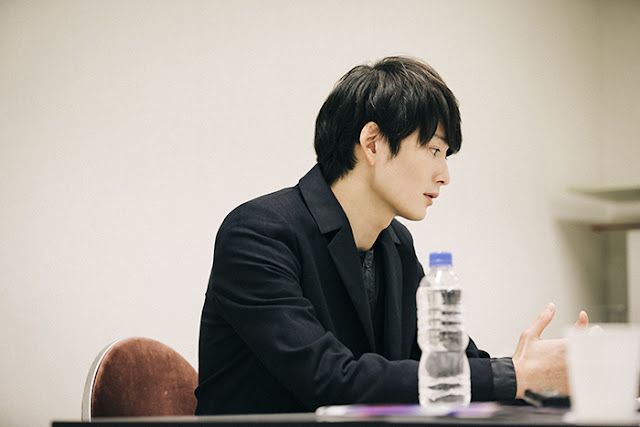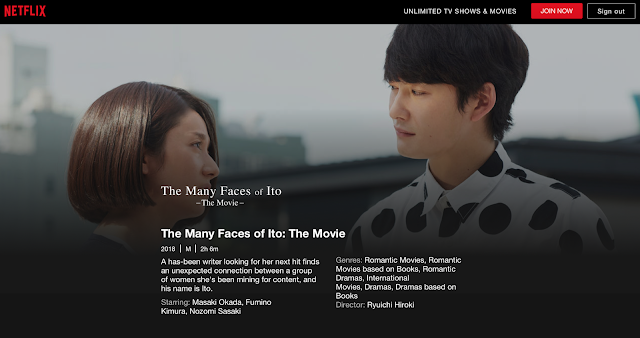The February 2019 interview on Hamlet
 |
| Okada Masaki, Feb 2019. Photo: Johnny Terasaka, Spice |
Okada Masaki: on the memories of the late Ninagawa Yukio and challenging Shakespeare’s “Hamlet”
14 Feb 2019
Interview by Fujimoto Mayu (translated by Icha)
Okada Masaki made his debut playing in Ninagawa Yukio’s “Total Eclipse” (2014) and since then has made impressive stage performances every year. In 2019, he challenges the role of Shakespeare’s “Hamlet” under the guidance of Director Simon Godwin, the Associate Director of the Royal National Theater in the United Kingdom and, from this summer onwards, the Artistic Director of the Shakespeare Theater Company in Washington DC. I interviewed Okada for his enthusiasm for the work.
Q: When you first entered the stage four years ago, did Ninagawa-san say “I want to do a Shakespeare with you”?
During my early stage days, Ninagawa-san would teach me many things, from the way I should stand on-stage to the way I should deliver my lines. I felt very happy to receive such attentions, even if they were just delivered to please me. Although at that time I hardly knew Shakespeare, but Hamlet is a masterpiece with lines that everyone has heard of. Thus, since now I’m working on such a masterpiece, I feel the need to visit Ninagawa-san’s grave to tell him all about it.
(I don't think it was Masaki who said that he wanted to do Shakespeare with Ninagawa-san. Had he said that, Masaki would have not used the word “kun”. He would use the word “shisho” or “sensei” to address Ninagawa-san)
Q: What kind of image did you have on Hamlet?
I think, although it’s a drama about revenge, “Hamlet” will be different depending on the viewer and the impression changes depending on the actor. Because Fujiwara Tatsuya-san already played this character before, I think some people already have a strong, particular image of Tatsuya-san. Thus, I’d like to create and play my own Hamlet. Although the hurdle is high, I’d like to search for my own Hamlet in the rehearsals and I’d like to do it well. I was able to work with Tatsuya-san in a drama series before I worked on my first stage play. At that time, we talked about stage plays…including the story of Hamlet. That conversation was imprinted in my head. That’s why this time, I informed Tatsuya-san that I would also do a Hamlet. I will use my physical strength and I also have fencing scenes. Since it is a work that requires such readiness, I must prepare it thoroughly. I want to be flexible so that I can interpret Hamlet from various aspects.
Q: What is the appeal of this work that you feel at the moment?
Turns out, playing Hamlet is exhausting. My impression after reading the book, I find that Hamlet was a person whose spirit was broken. However, he also mended his broken spirit. “Hamlet” is an intense story that absorbs you into that world, thus I think the impression of the first 30 minutes will be very important. Director Simon Godwin said that the story will mix with fantasy, thus I’m looking forward to it. I’d like to immediately get into the rehearsals.
Q: You haven’t gone into the practice or rehearsal routine, but what kind of Hamlet would you like to play at the moment?
To me, Hamlet’s loss from his father’s death and his burning desire for revenge lead to him having such a sex appeal. I’d like it to be such a beautiful but also transient feeling. If it’s proportionately done, I hope it will become a different Hamlet. However, unless such sentiments are put on the table, viewers might think, “What on earth does this person think?!”. It would be nice if I can give this white canvas such a charm. Also, the soliloquy parts were thought of and spoken in such dispassionate calmness. Having such thoughts now is pure fun. The more I think about it, the more I feel that I really want to do Hamlet. (Laugh).
 |
| Photo: Johnny Terasaka, Spice |
Q: What about your first experience with Shakespeare’s words?
I think those words are special but difficult. However, I have decided to do this work (laugh). The words are gradually coming into my head such that they become more familiar with repeated practice. It becomes more fun as I pursue the practice at home. Surely there are parts that are difficult to understand, but I’d like to deliver them straight into the customers’ ears. Shakespeare’s works are difficult, thus young people tend to avoid Shakespeare. However, I’d like people who would otherwise avoid it to see the play. Hopefully, this stage will become a medium for people to like Shakespeare. Also, using my own body, I think that it would be nice to be able to communicate with customers clearly.
(note: Masaki said言葉って、自分の口にだんだん合ってくるものだと思うので、Kotoba tte, jibun no kuchi ni dandan atte kuru monoda to omou node. I translate “mouth” as “head” because he was talking about how the words started to appear “in his mouth”.)
Q: Then we have the famous line of “To be or not to be, that is the question”
I haven’t been able to imagine how I shall say it, but I'm looking forward to it. Both myself and the viewers are wondering how I shall say that line. I’d like to explore various possibilities during practice without getting attached to the “correct” answer. Hamlet also has many long soliloquys. If I am to invent Hamlet as an emotional character, he might move intensely, but he can also just stand perfectly still. I have not experienced the stage yet and I haven't got a good grasp of everything. However, I think the stage is a living being that changes every single day. The viewers’ reactions also change every day.
In my experience so far, because there are some parts that I truly feel, I should not be too rigid while standing on the stage. This time, I’m truly looking forward to find in what way I will do Hamlet on stage. At the practice hall, I’d like to challenge myself without being shy.
Q: You have been on stage regularly since your stage debut. What are the real pleasure of being on stage for you?
Although being on the stage is hard, I also gained a lot of experience. Every day, my own ability is observed and tested. Every day I have to keep my physical condition in order. Those are to be expected from a pro… And for fellow performers, it’s very interesting that a day’s condition changes the impression of a role for that day. Perhaps today’s role is rather sullen, perhaps the colour of the stage or the colour of the voice changes, those are very delightful. In doing stage plays, there is a sense of fulfilment that cannot be obtained from movies/moving pictures. I have felt it since the first time I did my stage play. To this day, one thing that I regret and cannot forget is when I received an applause at the end of my first performance. I was chagrined and embarrassed, although the viewers kept applauding after the curtain call. I clearly remember that at that time I thought that I would like to be able to stand confidently one day.
Q: Applause can be an evil thing. There are people who remember it as a sense of accomplishment. But it is very curious that you felt “sorry” about it.
I guess I’m not yet satisfied with myself. I still want to pursue many things. Watching my seniors’ appearance on stage is so delightful, but I haven’t been able to do so properly. I experience this feeling many times. Thus, if I have a chance, I’d like to always do stage plays uninterrupted.
Regarding “Hamlet”, there are interesting parts and there are anxious parts. I also worry that it might have been better to do this after having more stage experience. However, having skipped that prior experience, I am very happy to have this story to tell; such is the feeling I would like to have in response to my fears. Also, I had wanted to do Shakespeare somehow before I reach 30. “Hamlet” being my first Shakespeare work is such a high wall, yet I am preparing myself to face it.
Q: What was your impression upon meeting Director Simon Godwin?
He’s an open and very warm person. He’s also a very sharp person, his viewpoints are very different from mine. I have the impression that my feelings are very important to him. When we were talking about Hamlet’s story, he asked me “What do you think of it?”. He first listened to my opinions. “What image do you have of Hamlet? How do you want to play him?”. With such finesse, he asked me those questions during our conversations. I thought, from here on, the more I talk about these things, the deeper I go. I’m looking forward to combining my ideas with Simon-san’s ideas.
Q: You have also experienced Simon-san’s workshop
The workshop itself, I have never had the opportunity to attend it, thus I have never experienced it before. Actually, trying to participate in the workshop was very interesting. The workshop was a series of surprising “I’ll do it like this!”. For those who know me, it is actually embarrassing for me to go all out and say those things.
I do not know if I could enjoy the workshop properly. What am I to do now with Simon-san’s chosen words? Do I want to use my body to convey myself? Those are very clear and interesting. I thought that such lessons caught me off guard.
And then, there are ways of moving the body. Because I was able to repeatedly do such expressions, I’m looking forward to learning the various ways of using my body on stage this time. Everyone moved around differently. However, when I wanted to follow someone, I follow the movement of that person. It thus became fun to keep up with everyone’s move.
After all, it is a stage play with many dialogues. However, I do think that such tricks are very important. I don’t want to feel embarrassed for things I don’t know. I want to absorb the lessons steadily. I want to experience various things in my 20s. Do I do well in the practice hall? I’m also looking forward to those things.
Q: It seems that Ninagawa’s words of “I want to do a Shakespeare with you” truly left behind a strong impression in you
(I don't think it was Masaki who said that he wanted to do Shakespeare with Ninagawa-san. Had he said that, Masaki would have not used the word “kun”. He would use the word “shisho” or “sensei” to address Ninagawa-san).
There may be a part of me that remains in that moment. Ninagawa-san has such a great presence. He was this great person who put me on the stage for the first time, he taught me about theatre from scratch. A scary, yet gentle person at the same time. He also taught me the pleasure of being on stage. To date, I cannot forget the way my emotions always got messed up as I returned from our practices. However, I am now re-living those experiences again. My first stage play with Ninagawa-san was with Theatre Cocoon. Now, I’m doing Hamlet with the same theatre, and – come to think of it – it makes me truly happy.
At that time, Ninagawa-san said to me, “If you’re tired of doing motion pictures, you can try the stage. Thus, try pouring everything out”. Well, I still don’t know how to pour everything out…and I have trepidations every time I stand on the stage, thinking how to deliver the dialogues. However, despite trying to forget those things, they are still vivid in my mind. Those emotions are still there, and thus I cannot keep myself away from the stage.
(Note: Ninagawa said 「それで全部発散しなさい」, “sore de zenbu hassan shinasai”. I translated 発散 (hassan) as “to let it all out”, or “to let/pour everything out”.)
Q: I got the impression that you immensely enjoyed your grand four stage plays so far
Oh no, it was heart-pounding every time (laugh). But I also find them enjoyable. Even when playing “Ningen Gowasan”, it was fun to think how to have a laugh for a change without disturbing the essence of the dialogues. It was fun to experience those with everyone.
Also, last autumn I played the role of a Rakugo storyteller in the drama "Shōwa Genroku Rakugo Shinjū”. There, I realised that when the storyteller himself doesn’t enjoy the story, the joy was also not transferred to the audience. The energy from the performer is very transferrable to the audience. I feel it regardless of what project I do. I think all of my projects are linked with such experience. I think, because of such experience, I can now do Hamlet. Even in Rakugo, the storyteller speaks alone, he is seen alone on stage while telling myriad stories. Thus, I think Hamlet’s soliloquys are like that. Now, having understood so many foundations that make him like that, Hamlet is extremely challenging and is thus worthwhile. I have never taken it into consideration, but it seems my projects have luckily taken me step by step towards Hamlet. Thus, I think I can face Hamlet in a good fashion.
Hair & make-up: FUJIU JIMI
Stylist: Oishi Yusuke
Coverage / sentence = Mayu Fujimoto (stage critic)
Photography = Johnny Terasaka
 |
| Photo by Johnny Terasaka, Spice |
岡田将生、故・蜷川幸雄の想いを受けて挑むシェイクスピアの『ハムレット』
蜷川幸雄演出の『皆既食-Total Eclipse-』(2014年)で初舞台を踏み、その後も毎年舞台作品で印象に残る演技を披露してきた岡田将生。2019年、ついにシェイクスピア『ハムレット』のタイトルロールにチャレンジすることとなった。演出を担当するのは、イギリスのロイヤル・ナショナル・シアターのアソシエイト・ディレクターとして活躍し、来年夏からはアメリカのワシントンD.C.のシェイクスピア・シアター・カンパニーの芸術監督を務めるサイモン・ゴドウィン。岡田に作品への意気込みを聞いた。
ーー4年前に初舞台を踏まれた際、蜷川さんから「君とシェイクスピアをやりたい」との言葉があったとか。
初舞台のとき、蜷川さんに舞台の立ち方からセリフの発し方まで、一から教えていただいたんです。そんな状態の僕に、嘘だとしてもそうおっしゃってくださったことがすごくうれしかったです。シェイクスピアをあまり知らなかったのですが、『ハムレット』は代表作で、誰もが聞いたことのあるセリフがありますし、その作品をこうしてできるということになり、蜷川さんのお墓に報告しに行かなくてはいけないなと思っています。
ーー『ハムレット』にはどういうイメージがありましたか。
復讐劇ですが、『ハムレット』は観る人によって見方がそれぞれ違うでしょうし、演じる人によっても印象が変わると思います。藤原竜也さんが演じられていたことがあるので、竜也さんのイメージが強い方もいると思うんです。ですので、僕ならではのハムレットを演じなくてはいけませんし、創りたいですね。高いハードルですが、これからの稽古で僕ならではのハムレットを探して、しっかりやっていきたいなと思います。竜也さんとは、初舞台を踏む前のタイミングで連続ドラマでご一緒させていただいたんですが、そのときに舞台のお話をよくしてくださって……。その中に『ハムレット』の話もあったんです。それが頭に残っていたんです。だから今回、竜也さんにも『ハムレット』をやらせて頂くんですと報告しました。体力を使うでしょうし、フェンシングのシーンもあります。覚悟が必要な作品なので、しっかり準備をしなくてはいけないなと思っています。ハムレットをいろいろな角度から解釈できるよう、柔軟でもありたいです。
ーー現時点で感じている作品の魅力とは?
やはり、ハムレットを演じられるということに尽きます。僕はハムレットの精神は壊れてしまっていると思うんです。本を読んでの印象としてですけど。でも、壊れていないように取り繕っている。『ハムレット』はあの世界に没頭してしまう濃厚なストーリーなので、冒頭の30分くらいでどう印象付けるかが大切だなと思っています。演出のサイモン・ゴドウィンさんは、ファンタジーが混ざるとおっしゃっているので、僕としてはそこも楽しみで、早く稽古に入りたいですね。
ーー稽古に入る前ではありますが、現時点でどんなハムレットを演じたいと思っていますか?
父を失った、その喪失感や、復讐に燃えていくところとかが、色気につながっていればいいなと思っています。そこが美しくもあってほしいし、はかない感じでもある。そこが比例すれば、また違うハムレットになっていくのかなと考えていたりします。そういう感情は、表に出さなければ出さないほど、観ている側は、「この人、どう思っているんだろう?」と考えるじゃないですか。そういう余白も含めて、一つの魅力につながっていけばいいなと。独白の部分も、静かに淡々と言うということも考えられるなとか、そうやって考えることが今すごく楽しいです。考えれば考えるほど、僕はハムレットをすごくやりたいんだなと感じます(笑)。
ーー初体験となるシェイクスピアの言葉についてはいかがですか。
特殊ですし、大変だと思います。でも、この作品をやると決めたので(笑)。言葉って、自分の口にだんだん合ってくるものだと思うので、稽古を重ねれば馴染むだろうし、追求していくうちにそこから楽しさも出てくるだろうし。どうしてもわかりづらい部分ってあると思うんですけど、ストレートにお客様の耳に入っていくようにしたいです。シェイクスピアの作品は難しそうということで、若い人たちに敬遠されがちなのかなとも思うんですが、触れたことのない方にも観ていただきたいですし、この舞台がきっかけでシェイクスピアを好きになってくださる方がいるかもしれない。自分の身体も使って、お客様にわかりやすく伝えられたらいいなとも思います。
ーー有名な「生きるべきか死ぬべきか、それが問題だ」のセリフもあります。
まだ自分が口にしているのを全然想像できないですが、楽しみです。自分がどんな風に言うことになるのか、観る方々も、「どうやって言うんだろう」と思われているでしょうし。それは稽古しながら、いろいろなことを試し、正解を一つにしないで可能性を探っていきたいなと思います。ハムレットは長い独白も多いんです。感情的なキャラクターとして創るんだったら、激しく動いて言うかもしれないし、すっと立ったまま言うかもしれない。僕はまだまだ舞台の経験が浅いので、すべてをよくわかっているわけではないんですが、舞台は生き物で、毎日毎日変わっていくものだと思います。お客様の反応によっても変わりますし。これまでの経験ですごくそこは感じる部分があるので、あまり硬くならずに、舞台に立ちたいと思っています。今回、自分がハムレットとしてどういう風に舞台に立つんだろうということがすごく楽しみです。稽古場では恥ずかしがらずに挑戦していきたいなと思います。
ーー初舞台以来、定期的に舞台に立たれていますが、舞台に立つ醍醐味とは?
大変でつらいんですが、得るものもすごく多いです。毎日毎日、生の自分、生の自分の実力を試され、観られているなと思います。毎日体調をきちんとコントロールしなくてはいけませんし。それはプロとしては当たり前なんですが……。そして演者の方々も皆さん、その日のコンディションによって役の印象が変わるのがすごくおもしろくて。今日はこの役ちょっと不機嫌なんだなとか、お芝居の色、声の色が変わる、それがすごく素敵で。舞台をやっていると、映像だと得られない充実感があるんです。初舞台のときからそれは感じていました。また、未だに忘れられないのは、初舞台の際、最後に拍手をいただいたのを本当に申し訳ないと思ってしまったことです。お客様からの拍手にまだ自分が追いついていないという悔しさで、カーテンコールもすごく恥ずかしくなってしまって……。当時、いつかちゃんと堂々と立っていられるようになりたいと思ったことをよく覚えています。
ーー拍手ってある種、魔物みたいなもので、それでもう達成感を覚えてしまう人もいるように思うのですが、ご自身で「申し訳ない」と思っていらっしゃったというところが非常に興味深いです。
まだまだ自分に満足できない、ということでしょうね。どんどん追求していきたいんです。先輩たちが舞台に立っていらっしゃる姿が本当に素敵なのに、自分はまだちゃんと立てていないんだなと感じることがすごく多くて……。だからこそ、チャンスがあるならば、あまり途切れることなく舞台をずっとやっていきたいという思いがあります。『ハムレット』に関しては、楽しみはあるんですが、不安もあって、もうちょっと舞台の経験をしてから演じた方がいいのかなと悩むこともあります。ですが、それを抜きにして、僕に話をくださったのが本当にうれしくて、それに応えたいという気持ちがあります。それから、30歳前に、どうしてもシェイクスピア作品をやりたかったというのがありました。初めてのシェイクスピア作品が『ハムレット』で、すごく高い壁だとは思うのですが、覚悟を持って臨もうと思っています。
ーー演出家のサイモン・ゴドウィンさんとお会いになっての印象は?
オープンで、とても明るい方。そしてすごく鋭いというか、視点が全然違っていて、僕の心情をすごく大切にしてくれるという印象も受けました。ハムレットの話をしているときでも、「君はどう思っているの?」と、僕の意見をまず聞いてくれるんです。「どういうイメージがある? どう演じたい?」と言われたときに、すごく繊細な人物というイメージがあるという話をしました。これから、いろいろ話して行けば行くほど、奥深いところまで行けるんじゃないかなと思いました。僕の考えとサイモンさんの考えとをすり合わせて行くのがすごく楽しみです。
ーーサイモンさんのワークショップも経験されたそうですね。
ワークショップ自体、なかなか機会がなくて、行ったことがなかったんです。実際参加してみると、本当におもしろかったです。「こういうことするんだ!」という驚きの連続でした。自分を出すということをよくわかっていらっしゃる方ばかりのなか、僕は自分を出すということがまだ恥ずかしくて……。ワークショップをちゃんと楽しめたかどうかはわからないんですが、サイモンさんの言葉選び、何を今させたいのか、こういう身体の使い方をしてほしいとか、それがすごく明確で、おもしろくて、こういうレッスンを怠っていたなと思ったりもしました。それに、身体にはこんな動かし方があって、こんな表現ができるんだということを改めて知ることができたので、今回の舞台でも、いろいろな身体の使い方を学べるのが楽しみです。全員がそれぞれ違う動きをしながら動き回って、でも誰かについて行きたくなったらその人の動きに合わせてついていくとか、みんなの動きが合っていくのがすごく楽しかったです。やっぱりお芝居って、セリフの掛け合いもそうですけど、そういう呼吸ってすごく大事だと思うので。知らないことは恥ずかしがらずにどんどん知って吸収していきたい、いろいろなことを体験したいというのが20代の目標なので、稽古場でもそういうことをやるのかなと思うと、それも楽しみです。
ーー蜷川さんに「君とシェイクスピアをやりたい」と言われたことが、やっぱり強く残っていたのでしょうか。
そこにとらわれている部分もあるかもしれないですね。それだけ蜷川さんの存在が大きいといいますか。僕を初めて舞台に立たせてくださり、一から教えてくださった、偉大な方。こわくて、優しくて。そして舞台の楽しさを教えてくださった。自分の感情がいつもぐちゃぐちゃになったまま稽古場から帰っていたこととか、未だに忘れないです。だけど、そういう経験が今、活きています。そんな蜷川さんとの初舞台がシアターコクーンだったんですが、今回『ハムレット』も同じ劇場でやれるというのが本当にうれしいです。すごく思い入れがあるので。
当時、「映像で疲れたら舞台をやればいい、それで全部発散しなさい」と蜷川さんが言ってくださったんですが……いや、発散の仕方なんてまだわからないですし、毎回ドキドキしながら、セリフ飛んじゃったらどうしようとか思いながら舞台に立っています。でも、そんなことを忘れて生き生きしている自分がいたりもするので、そんな感覚があると、舞台から離れられませんね。
ーーこれまで立たれた4本の舞台からは、堂々として、楽しんでいらっしゃる印象を受けました。
いやいや、毎回心臓バクバクなんです(笑)。でも、楽しさは見つけつつあります。『ニンゲン御破算』でも、ハプニングをどう笑いに変えて、しかもどうやって話の軸をそらさないようにするか、それを皆さんと一緒に経験できたのが楽しかったです。それと、昨年の秋はドラマ『昭和元禄落語心中』で落語家の役を演じましたが、そこでは、話している本人が楽しくないとお客様には伝わらないということに気づきました。演じている側がエネルギッシュだと観る側にすごく伝わるんです。それはどの仕事でも感じていますし、すべての仕事が経験としてつながっているんだと思います。そんな経験があったからこそ、今できるハムレット、今出せるものがあるんだろうなと思っています。落語も、ずっと一人でしゃべって、一人で見せるというところがありますが、多種多様な見せ方があるという意味では、ハムレットの独白にもつながっていくのかなと思っています。いろいろな土台をわかってきた今、ハムレットは非常にチャレンジし甲斐があります。自分では計算してきたということはありませんが、いただいたお仕事は運よくハムレットに向かって少しずつ階段を昇っていっているような気がします。だからこそ、すごくいい流れで臨めるんじゃないかなと思っています。
ヘアメイク:FUJIU JIMI
スタイリスト:大石裕介
取材・文=藤本真由(舞台評論家)
撮影=ジョニー寺坂


